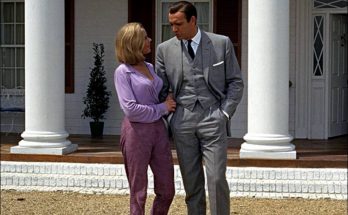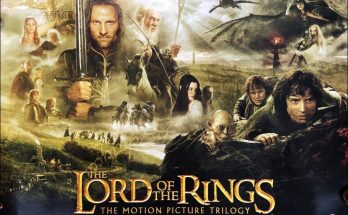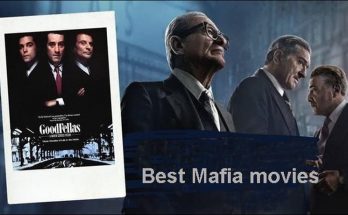All About Promised Land. Steve Butler, a corporate salesman whose journey from farm boy to big-time player takes an unexpected detour when he lands in a small town, where he grapples with a surprising array of both open hearts and closed doors.
Steve has been dispatched to the rural town of McKinley with his sales partner, Sue Thomason. The town has been hit hard by the economic decline of recent years, and the two consummate sales executives see McKinley’s citizens as likely to accept their company’s offer – for drilling rights to their properties – as much-needed relief.
What seems like an easy job and a short stay for the duo becomes complicated – professionally by calls for community-wide consideration of the offer by respected schoolteacher Frank Yates and personally by Steve’s encounter with Alice. When Dustin Noble, a slick environmental activist, arrives, suddenly the stakes, both personal and professional, rise to the boiling point.
About the Production
Promised Land is, says actor and screenwriter Matt Damon, “a relatable story with characters we all can recognize as people we know.”
“It’s an emotional story about what happens when real people and real money collide, and the surprising ways people respond when momentous decisions come their way,” comments actor and screenwriter John Krasinski.
Producer Chris Moore adds, “Promised Land is a very intimate portrait of some genuine characters, but it also grapples with the big issues we’re all dealing with now: what are our values, what’s important to us, how do we deal with genuine conflicts in our communities?”
Director Gus Van Sant remarks, “America is a big place and we are all part of it, so it’s hard to really get a grasp on our identity sometimes. What I loved about John and Matt’s screenplay is that they tackled big issues but with a lot of humor and humility. It’s a story about real people, with all their foibles as well as their greatness.”
“My character, Steve Butler, is a contemporary Everyman,” says Damon. “He left the farming community where he grew up because that town was dying. He migrated to the big city, as so many people do, in search of more opportunities. He has a good job and he’s making good money.”
Krasinski notes, “Steve is a corporate guy who thinks what he’s doing is right and doesn’t feel bad about trying to get ahead. He’s been on the road as a salesman, and now has a chance to reach the executive level.”
Moore adds, “When Steve shows up in McKinley with his partner Sue Thomason and their agenda to help save the town from financial decline and outright decay while simultaneously boosting his company’s coffers, he figures all will be well because he comes from the heartland and he’s able to speak the language of these people.
“That, it turns out, is both his strength and his weakness. Ultimately, he has to take stock of his whole existence and what he wants his life to be.”
“I see Steve’s evolution in this story as a metaphor for our country,” muses actress Rosemarie DeWitt, cast as Alice, a McKinley grade school teacher.
Academy Award nominee Hal Holbrook, who portrays McKinley high school science teacher Frank Yates, says, “I’m 87 years old, and I think we’re living at an extraordinarily critical time. The whole idea of democracy is dependent upon people working together, and without compromise there can be no democracy.”
Academy Award winner Frances McDormand, who plays Sue, offers, “Until we question everything that we possibly can, we’re not going to have any possibility of a future that’s within our control.”
“The stakes are as high as they’ve ever been for all of us,” agrees Damon. “How would our parents or grandparents have handled what we face in our day and age? How are our grandchildren going to fare? Those are tough questions for anyone to deal with.”
Promised Land keenly distills questions of how American values have evolved. These explorations come in part through a small town’s decisions when a natural gas company seeks to extract gas from shale rock formations through the process known as hydraulic fracturing, or “fracking.”
Damon explains, “The plot follows Steve and Sue as they try to persuade the McKinley community to lease the drilling rights of their farmland to Global Crosspower Solutions, which Steve and Sue work for, and which – valued at $9 billion – is one of the largest energy corporations in the country.
“The townspeople have divergent opinions about whether this is a good thing or not. In a lot of cases, these leases are the only thing keeping a family farm from foreclosure.”
DeWitt adds, “The people of McKinley are concerned about feeding their kids and improving their school systems.”
“This is a complex issue that’s dividing a lot of communities right now,” says Damon. “What better setting for us as storytellers to ask questions about who we are as Americans?
“Steve believes in what he’s doing, getting people to lease their land for potential gas wells, because he wants to keep communities afloat.”
Krasinski comments, “Natural gas drilling is a contemporary issue that serves as a perfect backdrop to our story, which we set out to write as an exploration of modern-day American identity. It’s an issue where, like high-stakes poker, the potential gains and the potential losses are enormous. For an individual faced with the opportunity, there’s a complex decision to be made.”
Scoot McNairy, cast as farmer Jeff Dennon, remarks, “I felt this was an important story to tell because it’s not anti-something or pro-something; there are different perspectives, and nobody likes a belief forced on them.”
“Energy is a big thing that people are debating,” observes Moore. “Right away, that imparts a tension to our movie, and creates a dialogue.”
“I feel that John and Matt’s script explores this dialogue in a genuine way. We don’t live in a black or white world,” says DeWitt.
Damon notes that “communities in America are quite aware of the natural gas drilling question. A friend of mine does what Steve does – he’s a ‘land man’ – and he told me that when he drives up to a farm, people are waiting and ready because they are hip to what’s been going on.”
“That’s the case with my character, Jeff,” adds McNairy. “He’s a farmer who has pride in his country and pride in his land, which has been in his family for generations. Steve’s arrival strikes a nerve in Jeff.”
Krasinski says, “Audience members will make their own decisions regarding the issue, but our goal is to affect moviegoers – with emotion and humor – in dramatizing these characters making their decisions and facing up to challenges both internal and external.
“When my character, Dustin Noble, shows up, he becomes an instant foil for Steve. The way they react to each other is not too far removed from school days; what’s funny is how a much greater concern just becomes, for them, who’s going to get the bigger stick in the playground.”
He elaborates, “Through these characters, I also wanted to explore the power of community in America. I remembered tales that my father told me about growing up in a small town. There was a belief in each other that I think was paramount. What happens to that kind of town today, facing huge change amidst economic turmoil, and facing the question of how to act on issues together?
“I brought the original concept to [novelist/screenwriter] Dave Eggers, for whom these concerns are close to heart. He and I hashed out ideas, and a story took shape.”
The initial draft was titled Gold Mist, an ironic reference to the color of a luxury car purchased by a down-on-his-luck farmer, and the mode of speculation in that draft was wind energy.
Damon and Krasinski had met through the latter’s wife, actress Emily Blunt, with whom the former had starred in The Adjustment Bureau. When Krasinski mentioned the script over dinner one night, Damon became interested and soon began working on it with him. “It was a blast,” remembers Krasinski. “We got along so well from the beginning. We were becoming friends and collaborators.”
“John has got this incredibly fast brain,” marvels Damon. “So the writing would come quickly and we would laugh together. It reminded me of writing with Ben Affleck, a very similar feeling and above all else a lot of fun – I’d forgotten just how much.”
Moore joined the duo in producing the movie, as he was drawn to “the characters, first of all; I think audiences will be able to see parts of themselves in more than one of the roles. Also interesting to me was the concept of how someone in corporate America would wrestle with what his company is doing versus what his own job is – or might be.
“To me, this script had the potential to become an interesting movie like ones that you would see in the 1970s. It’s harder to get those made now, but like on Good Will Hunting we wanted to try. Like that movie, there’s definitely humor in Promised Land as well.”
As Damon and Krasinski scouted towns in upstate New York, they encountered a setback. Moore notes, “From that and their research, they realized that way the windmill business really functions wouldn’t work for the movie, dramatically speaking.”
Damon remembers their having to accept the fact that “we had built this story on something that wasn’t quite true. It was a tough moment in the life of this project.”
Moore reflects, “We wanted to move the project forward, but this became a hill to get it up and over.”
Krasinski and Damon spoke about transposing the story to a different setting with another issue as a backdrop while exploring the same themes and character studies. Coal mining, oil drilling, and salmon harvesting in Alaska were all considered. While Damon was away working on another movie, Krasinski came upon a natural gas drilling story and began a fresh round of research. He remarks, “It was the perfect contemporary lens through which to examine our questions of community and integrity.
“I wanted to establish an authentic foundation for those examinations.” Accordingly, researching the relatively new chapter in energy exploration meant that Krasinski logged hours watching video accounts of whole towns and individual neighbors debating the issue, as well as reading voluminous reportage.
Views: 96




